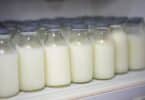Over the past 2 decades many studies have looked at the developmental benefits of breastfeeding. An new study that was conducted by Brigham and Women’s Hospital, and published online in The Journal of Pediatrics, has found more proof that nursing your baby – even for a short time, is beneficial to their brain development and cognitive functions.
For the study Mandy Brown Belfort, MD, the lead author and her team followed 180 pre-term infants from birth to age seven. The research found babies who were fed breast milk within the first 28 days of life had had larger volumes of certain regions of the brain at term equivalent and had better IQs, academic achievement, working memory, and motor function.
“Our data support current recommendations for using mother’s milk to feed preterm babies during their neonatal intensive care unit (NICU) hospitalization. This is not only important for moms, but also for hospitals, employers, and friends and family members, so that they can provide the support that’s needed during this time when mothers are under stress and working so hard to produce milk for their babies,” says Dr. Brown Belfort said.
The infants, who were born before 30 weeks gestation, were enrolled in the Victorian Infant Brain Studies cohort from 2001-2003. These babies received breast milk as more than 50 percent of of their nutritional intake from birth to 28 days of life.
Their regional brain volumes were measured by magnetic resonance imaging (MRI) at each baby’s term equivalent age and at seven years old, and the team performed cognitive (IQ, reading, mathematics, attention, working memory, language, visual perception) and motor testing at age seven.
The findings showed that, across all babies who received predominantly breast milk on more days during their NICU hospitalization had larger deep nuclear gray matter volume, an area important for processing and transmitting neural signals to other parts of the brain, at term equivalent age, and by age seven, performed better in IQ, mathematics, working memory, and motor function tests.
“Many mothers of preterm babies have difficulty providing breast milk for their babies, and we need to work hard to ensure that these mothers have the best possible support systems in place to maximize their ability to meet their own feeding goals. It’s also important to note that there are so many factors that influence a baby’s development, with breast milk being just one,” says Belfort.
In the future, the team hopes other MRI techniques could provide more information about the specific ways in which human milk intake may influence the structure and function of the brain.







